Peter MALONE
Saturday, 18 September 2021 19:21
Hear No Evil

HEAR NO EVIL
US, 1993, 98 minutes, Colour.
Martin Sheen, Marlee Matlin, D.B.Sweeney, John C. McGinley?.
Directed by Robert Greenwald.
Hear No Evil is a routinely enjoyable crime thriller with touches of romance. With the hearing impaired heroine, it has parallels with such screamy thrillers as Wait Until Dark, where Audrey Hepburn was blind.
Marlee Matlin, Oscar-winner for Children of a Lesser God, is a vigorous heroine - although, so many times, she has to be helpless and screaming. D.B. Sweeney (The Cutting Edge, No Man's Land, Eight Men Out) is the hero. Martin Sheen has a strong role as a corrupt policeman.
The film is set in Portland, Oregon, and makes excellent use of cityscapes. There is a seeming winding-down after about an hour, with everything neatly tied up - but there is a somewhat unexpected twist to bring the film to its climax.
1.Entertaining thriller, crime story, police work?
2.The city of Portland, the use of the city, homes, the bridge, precincts? Musical score?
3.The title and the hearing impaired, prejudice and ignorance about them, ways of communicating, learning to communicate, sign language? Possibilities of speaking even though not hearing? The use of the hearing impaired for the thriller devices - especially with the paging system?
4.The young man on the horse, the guard eating, the brutal murder, the stealing of the coin? Brock and his corruption, masterminding the robbery? Mike and his newspaper denunciations of Brock? The coin and its disappearance, accidents, the car plunging from the bridge?
5.Mike and his intensity, friendship with Ben, training with Jillian's help? Discussing with the criminal, getting the coin? Videoed by Brock? Going back to Jillian's, hiding the coin? Brock's attack and barging in? His death? The pathos of the funeral - Ben's speech, Brock's presence? The irony of his faking the death and coming after the coin? The brutal intruder? The finale and the confrontation with Jillian? His death?
6.Jillian, in Portland, family background, work, athletic, training people, friendship with Grace? Training Mike? The relationship, Brock barging into her house? Communicating with Ben, the funeral? Questions and suspicions, Brock's menace? Under surveillance? With Ben, with Grace, the bath, the brutal intruder? Ben wanting to protect her, going into his house, sharing with him - and the ironies of noise and silence, his inability to sleep? Brock threatening her in the car park? With Ben and her delight with the children, telling them stories? In the hospital with Grace? The plan to steal the video, her being terrorised and running away? The plan to track Brock, jogging, the attempted arrest, her lip-reading? Going on holiday with Ben, surf skiing, alone in the house, the pager, the phone, the death of the proprietor? Finding the coin? The final confrontation with Mike and his death?
7.Ben, scaling the walls, at work in the restaurant? The funeral? The information given by Mike, concealing it from Brock, confronting him? Helping Jillian? Taking her to the hospital with Grace? Taking her to his house, staying, his insomnia - and the comic attempts to sleep? The noise? The plan for the stealing, getting into the house, evading Brock? Setting him up, being videoed? Away for the holiday, away, phoning Jillian? To the rescue?
8.Brock and corrupt, his plan, the tradition of corruption in the police force, his assistants? The clashes with Mike? The brutal questioning? At the funeral? Standover tactics on Jillian? Menacing her in the car park? The opera, coming home quickly, his house being burgled? His being set up - and arrested?
9.Grace, her friendship, experiencing the brutality?
10.Calling in the FBI, the smoothness of the operation in setting up Brock?
11.Popular ingredients of crime and detection stories? Romance? The mystery twist at the end?
Published in Movie Reviews
Published in
Movie Reviews
Tagged under
Saturday, 18 September 2021 19:21
Hazard of Hearts, A
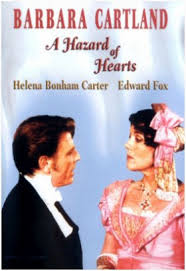
A HAZARD OF HEARTS
UK, 1987, 89 minutes, Colour.
Diana Rigg, Edward Fox, Helena Bonham Carter, Christopher Plummer, Stewart Granger.
Directed by John Hough.
A Hazard of Hearts is a lavish period English film with the courage of its convictions. It is in the Gainsborough '40s tradition (the costume dramas with James Mason, Stewart Granger, Margaret Lockwood, Phyllis Calvert). The film has the Gainsborough emblem at its start.
However, this is a movie based on a novel by Barbara Cartland - and has all the popular ingredients of this kind of historical romance (cliches, melodrama and all). It was directed by John Hough, better known for his horror and action films (Twins of Evil, The Legend of Hell House and the Disney Watcher in the Woods).
The film is beautifully photographed on English locations, countryside and mansions. Costumes and decor could be called gorgeous. The film has a very strong cast led by Diana Rigg, trying to be the British Bette Davis. Edward Fox is the villain. His behaviour is dastardly, though the word, surprisingly, is not used. Helena Bonham Carter is the heroine and there is a strong supporting cast including Eileen Atkins, Christopher Plummer, Anna Massey.
For those who enjoy this kind of story, it will probably be superlative. For those slightly sceptical, they will be amazed at their having to suspend so much disbelief as the film rolls on, capitalising on its conventions.
1.Entertaining period melodrama? Britain and its traditions? The British film traditions of melodrama? The film with the courage of its convictions?
2.The location photography, the mansions, the countryside, the city? The coast? Costumes and decor and their lavish style? The lush musical score?
3.The title, the focus on Serena and Justin?
4.Serena, at home, her wealth and poverty, her father and his gambling, the loss of his property, the loss of his life? The hostility towards Lord Rutham? Her being in his power? Rescued by Justin? The devotion of her maid? Travelling to Justin's home, the clash with his mother? In the house, her suspicions of Justin? Lord Rutham and his attentions? The gambling and his winning, his abduction and her escape? The finding of the older Lord Vulcan and friendship with him? Dominated by Harriet? The gamblers, the potential marriages? The smugglers and her discovery of the truth? Sinister behaviour in the house? Discovering the truth about Justin? The duel, her hurrying to London? The clash with Harriet? The happy ending and her becoming the lady of the house after being despised for her poverty? The heroine of this kind of period melodrama?
5.Justin, his brooding presence, the gambling, the clash with Lord Rutham? Serena's father's death? His friends, going to visit Serena, attracted by her? His aloof behaviour? The gradual unmasking and audiences seeing him to be the hero? His relationship with his father and preserving his name? The dominance of his mother and her snobbery? His knowledge of the smuggling? The confrontation with his mother? Lord Rutham, the abduction, the duel? Serena hurrying to him? His love for her? The young woman wanting to marry him? His decision to marry Serena? The brooding, smouldering hero of this kind of melodrama?
6.Diana Rigg as Harriet, the grand dame manner, her snobbery, dominance of her son, running of the household, her attitude towards Serena, putting her in the attic, commenting on her? Her lifestyle, costumes, wealth? Lord Vulcan and his absence? The gambling? The clientele? The smugglers and her haughty behaviour? Whipping them, deaths? Her deal with Lord Rutham? The confrontation with Justin, his losing patience, his control over her? The confrontation with the smugglers, the police? Her losing? The villainess of this kind of melodrama?
7.Lord Rutham, dastardly, scowling, the gambling with Serena's father, his cruelty, losing to Justin? The pursuit of Serena? Coming to the home, his alliance with Harriet? The deal? The abduction? The duel and his cowardly behaviour? His return, the confrontation with Harriet, the swordfight with Justin, his death? Typical villain?
8.Serena's father, love for his daughter, compulsive gambling, the warnings, Lord Rutham, his motivations, the tension of the gambling, his losses? Justin winning from Lord Rutham - too late and his killing himself?
9.Nicholas, his love for Serena, his love for the other woman and her infatuation for Justin, their presence in the household, helping Serena, the woman and her love for the strong men, wanting to be bullied, her love for Justin with his ignoring her? Nicholas and his violent outburst - and her cliched but humorously melodramatic succumbing to him?
10.The maid, her devotion to Serena, going to the new house, her sense of premonitions, Harriet's attempt to kill Serena and the maid's death?
11.Harriet's maid, her control of the household, with the smugglers?
12.The world of English aristocracy, their wealth, morality, gambling? Arranged marriages?
13.The smugglers, the goods from France, Harriet and her control, their reactions against her, the violence and the fighting? The police and their investigations?
14.The highwayman, his poverty, helping Serena, returning her home?
15.The popularity of this kind of paperback lavish telemovie? And the enthusiasm and strength given it by the production values and the performances of the cast?
Published in Movie Reviews
Published in
Movie Reviews
Tagged under
Saturday, 18 September 2021 19:21
Having It All
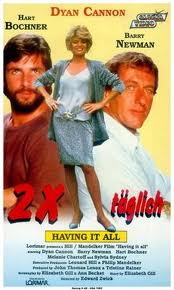
HAVING IT ALL
US, 1982, 100 minutes, Colour.
Dyan Cannon, Barry Newman, Hart Bochner, Sylvia Sidney.
Directed by Edward Zwick.
Having It All is a comedy telemovie, reminiscent of the '50s British comedy, The Captain's Paradise, with Alec Guinness as a bigamist with wives Yvonne de Carlo and Celia Johnson. This time it is the '80s, with Dyan Cannon as a successful fashion designer, a husband who is a wine importer in New York, and a Californian artist. She has troubles trying to reconcile the different lifestyles of East Coast and West Coast. She gets advice from her friends - seeming to have it all. However, while there is comedy about bigamy, the two sides of the heroine's nature, the film sorts out priorities to move towards a conventional and loving ending.
The film was directed by Edward Zwick, best known for creating Thirtysomething as well as directing About Last Night and the excellent Civil War film, Glory.
1.Popular telemovie comedy? Glossy style? Geared towards the wide home audience?
2.East Coast and West Coast? New York and California? The different worlds? Contrasts? The world of fashion design? The musical score, the theme song?
3.The title, Thera and her lifestyle, her husbands? The irony of the difficulties - and having to make a resolution?
4.Dyan Cannon as Thera: fashion designer, at home in the fashion world? Success? The salons in New York and the range? The contrast with Los Angeles? Her marriage to Peter, his wine business? The New York base? Her manner with him? The divorce - and her believing that she was divorced? The contrast with Jess, California, the artist? The marriage? The contrast between mature and sophisticated behaviour and wild and spontaneous behaviour? Her attempts to keep the husbands apart? Each wanting to be with her? The near miss at the Los Angeles airport? Her attempts to tell them the truth? The Thanksgiving dinner and the double booking? Her juggling of her timetable? Changes of clothes in the airport? Her relationship with Dace, personal assistant, friend, advice? The clash about the designs, credits? Peter and Jess turning up at the fashion show? The divorce writs from Peter and Jess? Her visits to her mother? Talking things over, her mother's divorce? Being independent? Her time alone, the Valentine card, the visit to Jess - and his girlfriend? The meeting with Peter, their loving each other, the change of style, being impulsive - the reconciliation and her future?
5.Jess, young, Californian, the artist, impulsive, wild? His own manner and bringing the wildness out of Thera? Dace? His puzzle about Thera's behaviour, wanting more time with her? Los Angeles airport? The Thanksgiving dinner? In New York, seeing Thera at Peter's apartment? His discovery of the truth, the divorce writ? His leaving Thera, the younger girlfriend?
6.Peter, the older man, the marriage? The break-up and the divorce? Her relationship with him? The style, clothes, manner? Her visits to his apartment, Thanksgiving dinner? The fashion show and his discovering the truth? Wanting the divorce? Their rediscovering each other and the reconciliation?
7.Dace, her friendship with Thera, working? Knowing the truth, helping her with her double life? The clash about the designs, the credits, her leaving?
8.Thera's mother, manner and style, experience of divorce, advising her daughter, advising her to be independent?
9.The world of fashion, design, shows, salons, models?
10.Popular and romantic entertainment - American style?
Published in Movie Reviews
Published in
Movie Reviews
Tagged under
Saturday, 18 September 2021 19:21
Haunting of Sarah Hardy, The
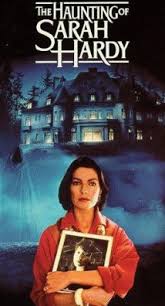
THE HAUNTING OF SARAH HARDY
US, 1989, 92 minutes, Colour.
Sela Ward, Polly Bergen, Michael Woods, Morgan Fairchild.
Directed by Jerry London.
The Haunting of Sarah Hardy is an attractive-looking telemovie. However, its contents are entirely predictable - audiences will have seen this plot many many times. The almost Gothic opening with the mysterious suicide of a mother in black and the effect on a child; the lyrical marriage of the heroine to a dashing young husband; the reappearance of the mother's ghost and the terrorising of the heroine; the revelation of the collusion between the husband and the wife's best friend; the pretence of death by the wife; the haunting of the husband, the death of the girlfriend, the shock ending with little intrinsic meaning.
The material is familiar, indeed predictable. It is enjoyable of its kind, though the ending is unsatisfactory. Direction is by Jerry London, director of many telemovies including Shogun. Sela Ward (Nothing in Common, Hello Again) is an attractive heroine. Morgan Fairchild emerges as the villain.
1.Enjoyable Gothic melodrama in modern setting? Predictable and familiar?
2.Colour photography, locations, the mansion, the effects for the opening? The world of wealth, society? Shocks and editing? Musical score?
3.The title, the focus on Sarah, her marriage, her mother, her husband and Lucy?
4.Sarah as a child, the burial of her father, the dominance of her mother, insanity, the piano, her mother wanting her to wish she was dead, her suicide in the sea, Sarah watching? The care of Miss Stepford?
5.The wedding, happy, Sarah and Austin? Allan and Lucy watching? The reception? The happy life at home, Austin at work, Sarah and the household, Miss Stepford's intervention? Her firing her? The beginnings of the haunting - the presence of the mother, the voice, the photo, the music? Sarah and her going to see Allan, getting some counselling? Her pregnancy? The support of Austin and Lucy? Outings with Lucy at her soap opera set?
6.The shock, Lucy in hospital, the abortion? Her growing fear, wanting a divorce? Overhearing the phone call?
7.Austin as the charming husband, Lucy as the friend? Their collusion, greed? Putting the plan into action, to kill Sarah, her disappearance? The funeral?
8.Sarah's reappearance, revealing herself to Allan? Austin and Lucy, their fear? Austin shooting Lucy? Driving off and the crash?
9.The possibility of a future between Sarah and Allan? The reappearance of Austin in the bed and the sudden ending?
10.Miss Stepford, her support, audience suspicions of her, her wanting the money? Her not coming back into the plot?
11.The popular ingredients of Gothic melodrama and murder and greed set in the late '80s?
Published in Movie Reviews
Published in
Movie Reviews
Tagged under
Saturday, 18 September 2021 19:21
Harley Davidson and the Malboro Man
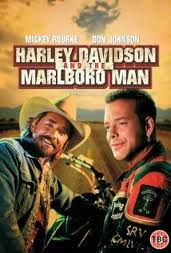
HARLEY DAVIDSON AND THE MARLBORO MAN
US, 1991, 99 minutes, Colour.
Mickey Rourke, Don Johnson, Chelsea Field, Daniel Baldwin, Giancarlo Esposito, Tom Sizemore.
Directed by Simon Wincer.
Harley Davidson and the Marlboro Man was written by actor Don Michael Paul and directed by Australian Simon Wincer (Phar Lap, The Lighthorsemen, Daryl, and Emmy winner for Lonesome Dove). Mickey Rourke and Don Johnson rely on their screen images and play a pair of middle-aged searchers, Rourke on his Harley-Davidson?, Johnson with his unlit, until the end, Marlboro cigarette. The setting is Los Angeles and Las Vegas 1996 - and an unattractive world it is.
Big companies are run by drug bosses. Bars which are noisy and raucous but nevertheless homely are under threat and owners to be evicted by the banks and companies. The two engineer an armoured car robbery and find that instead of money to pay off the banks, they have taken great amounts of a new drug. Thugs in long black overcoats (echoes of The Good, the Bad and the Ugly westerns) pursue them and there are shootings and shoot-outs.
The film is violent, crass and macho in its stances. Rourke ambles his way through the film, though Don Johnson gives a performance. Of interest for diehard action fans.
1.Road movie, male bonding in the United States, macho action?
2.The world of 1996, California and Nevada, Los Angeles and Las Vegas? Similarities and differences, squalor? The title, the focus on the heroes, the bikes and cigarettes?
4.The macho world, action, searching for self, machines? Male bonding? The role of women, relationships? The sense of right, loyalties, action?
5.Harley and his life, background, fights? The bar brawls? On his bike? Friendship with the Marlboro Man? Their going back into the past? In Las Vegas, the bar, going to Los Angeles? Their old friend and his bar, their other associates? Life in the bar, drinking, the singing, the exotic dancing? The eviction and their decision to rob the guarded van? The set-up, the detours, successful operation? Discovery that they had drugs instead of money? The decision to confront the boss, going into the big building? His outwitting them? Sending his overcoated thugs? Their going to Las Vegas - and the irony of having the tracking device with them? Their eluding pursuit? The confrontation and the shoot-out with the hulks of the planes? The separation of the men - Harley turning up? His search for self, avenging his friends - and the girl who wants to go nowhere and is riding off into the sunset?
6.The Marlboro Man, Robert? Don Johnson's style? Life and background, his searching, unable to settle down, the unlit cigarette? The bar brawls? The bond with Harley? The pursuit by the policewoman - and it being his girlfriend? Their relationship, her wanting permanence, his inability to commit himself? The robbery, the confrontation with the boss? Las Vegas and their being tracked? The chase, separating? The final shoot-out? Their going to the building - and the businessmen, their having paid the helicopter pilot to be on their side, the shoot-out - and the executive clinging to Robert's boot, the heritage from his father - and falling to his death?
7.The bar, its owner, the 40 years, the friends, the style in the bar, their being evicted? The patrons? The staging of the robbery, the deaths of their associates - and the massacre in the bar?
8.The executive, his work in the bank, peddling drugs? The new designer drugs? The drivers of the van and their being held up? The thugs and the western-style shooting? The final confrontation with the main thug, his being outwitted - and the comedy with Harley's inability to shoot?
9.Robert's girlfriend, the policewoman, the ride and the chase? Their relationship, her new boyfriend, his going to her - and the possibility of a future together?
10.Stunts and action - the leap from the high building into the swimming pool? The shooting - and Harley's inability? Violence, macho action, the heroes on the side of right?
Published in Movie Reviews
Published in
Movie Reviews
Tagged under
Saturday, 18 September 2021 19:21
Harlem Nights
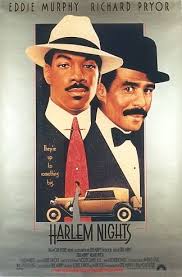
HARLEM NIGHTS
US, 1989, 115 minutes, Colour.
Eddie Murphy, Richard Pryor, Redd Foxx, Danny Aiello, Della Reese, Stan Shaw.
Directed by Eddie Murphy.
Harlem Nights has three credits for Eddie Murphy before the title. Then there is his role as executive producer, writer and director as well as star. It is very much an Eddie Murphy film. It is also geared to the black audiences of America who responded to it with great enjoyment. It captures the black spirit, black humour, black cursing and the enjoyment of verbal fights. It also re-creates Harlem in the 1930s, shows the blacks going up against the white gangsters and winning. It also shows a black champion in the boxing ring conquering the Irish contender (with some satire on black and white relationships as the whites stand and cheer the Irishman then sit abruptly while the blacks stand and cheer their champion).
The film has a harder edge than some of Murphy's other comedies - especially in the killings. While the film is comic, there is a serious edge to some of the deaths, especially for Murphy's own character, which is not quite as relaxed and humorous as in previous films. However, he does give a softer edge to the character played by Richard Pryor. There is a good assortment of black comedians led by Redd Foxx. The whites are represented very well by Danny Aiello as the epitome of a corrupt cop and Michael Lerner as Bugsy, the Harlem gangster.
It is familiar material from the gangster films and from Francis Ford Coppola's The Cotton Club. However, it gives a black perspective on these events, characters, attitudes and behaviour. The musical score is by Herbie Hancock (Round Midnight).
1.New York settings, the black clubs, gangsters? A piece of black Americana?
2.The work of Eddie Murphy - production, writing, direction? Acting? His comic skills? His verbal dexterity? The plot, the characterisations? The hard edge? The echoes of American racism?
3.New York 1918, 1938? The nights, the streets, the clubs and buildings? Dark and smoky? The songs and Herbie Hancock's jazz score?
4.The prologue and its tone? Quick, the young boy, the club, Ray, the gambling, Benny and his glasses, the threat of the black man with the knife, Quick shooting him dead? The results?
5.The strength of the humour, the black culture, black style? The importance of language, swearing and verbal interactions?
6.Ray, his small club, outside the law, the gambling? The attack and Quick shooting the attacker? Adopting him as his son? The twenty years, going up in life, his candy shop, the big club, his relationship with his staff? Prospering? The comic touches? Benny and his need for glasses? Vera and the girls, her being shot by Quick? The visit of Cantone to his house? The verbal sparring, the pretences? Cantone's threats? Cantone's return and arresting the clientele? Ray bailing everyone out with a gift? His relationship with Quick, their discussions of policy? The Cantone threat? Dominique and her visit to the club? Small and his visit to the club? The champ? The plan for the scam, the details, the execution, thinking ahead? The execution of the change-over of the money? Trapping Cantone, putting him in the bank vault? The end, getting out of New York? A future? Richard Pryor's comic style and his genial presence? A balance to Eddie Murphy's harder edge?
7.Eddie Murphy as Quick, the two sides of his character - tough and humorous? In the club, his work, suave, meeting Dominique and attracted? His tongue and his swearing, verbal abuse, humour? The clash with Vera, the fist-fight, shooting her toe? His later apologising? Cantone's threat and his reaction? His theory of who you shoot rather than how many you shoot? His attraction towards Dominique, the contact, the date, Bugsy's presence? Bugsy's offer and his refusal? Small's death and his discovery of the body? The pursuit by Small's brother, the humour, the shooting? The three shots and three dead? Dominique, the sexual encounter, the gun under the pillow, his killing her? The preparation for the scam, his participation in it, his threat to Cantone, putting him in the bank vault? The humour and the edge?
8.Benny, the old man, his experience, the gambling, not having glasses and people complaining? His going along with the plot? The happy ending?
9.Vera, her size, the girls, the fight with Quick, the shooting of her toe? Her sentiment, a softy at heart? The final misleading of Bugsy?
10.The club, life at the club, the gambling, the music, the dancing? The staff and their style? The patrons?
11.Bugsy and his size, relationship with Dominique, ruthlessness, smashing his henchman's hand, ordering deaths and the slitting of Small's throat? Relying on Cantone? The dinner with Quick and inviting him to the job? His discussions with Dominique and setting her onto Quick? News about the fight, the bet? The blasting of his club? The robbing of his money? The final set-up and the explosion? The picture of the white gangster?
12.Dominique, her relationship with Bugsy, the attraction towards Quick, the dinner, the night encounter, sex, business, death?
13.Cantone and his visit to the house, the corrupt cop, smile and irony? Threats to Ray? Going to the club, sneering? The arrests? Going to Bugsy, the news about the bet? His following Quick and Ray during the scam? His superior attitude, the irony of his being caught, in the vault, the small breaths?
14.Richie as the bagman, the group setting Sunshine on him, the encounter in the bar, his believing everything, the relationship, his separation from wife and kids, picking up the money, taking Sunshine along, the arrest, going to Bugsy and being called a moron?
15.The world of Harlem in the '30s? Sympathies, values? A picture of black America in Harlem?
Published in Movie Reviews
Published in
Movie Reviews
Tagged under
Saturday, 18 September 2021 19:21
Harbour Beat
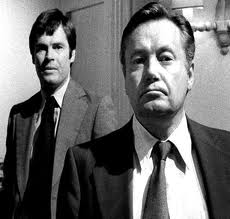
HARBOUR BEAT
Australia, 1989, 95 minutes, Colour.
Gary Day, John Hannah, Steven Vidler, Bill Young.
Directed by David Elfick.
Harbour Beat is a Sydney police thriller. It was co-written and directed by producer David Elfick (Newsfront, Undercover). It is a fast-paced action thriller focusing on the police, corruption, drugs and land deals.
The film opens in Glasgow with some authentic settings to introduce a character played by John Hannah. Steven Vidler is his Australian partner. The film resembles the American buddy films but is highly critical of the abuses of mateship, the blindness in mateship which makes people refuse to see the faults in their mates.
The film uses its Bondi and Sydney locations to great advantage. While not particularly original, it is done with style and verve.
1.Entertaining police thriller? Corruption, drugs? Big business?
2.The initial Glasgow setting, authentic atmosphere? The contrast with Sydney, Bondi Beach, the harbour? Musical score and songs?
3.The title, the focus on Sydney?
4.The prologue: the introduction to Neil Mc Bride, Glasgow, his work, the city, the loner, not trusting, his girlfriend walking out on him, the police and their ousting him?
5.The introduction to Lance Cooper: the surf, the policeman on Bondi Beach, chasing the thief? The tribute to his mate, Walker? Introduction to Neil, antagonism towards him?
6.The two as partners, working alone, the philosophy of mates? Lance explaining the drug busts? The visit to Simone, Neil's cover, the massage, the effect on him, the relationship with her? Back at the office? Relationship with the boss, with Detective Mason? Research, the information about the land dealer? Neil pretending to be Ross and having the interview?
7.Lance, working with Neil? Shot at on the surfboard, bashed? His talking to Walker, the break-up of the marriage, visiting his wife, suspecting the truth but not wanting to face it? The discovery of the plan, the planting of the drugs, the cases being dropped? Neil suspicious of Lance being on the take? Not taking the money and giving it to the Orthodox church? Lance confronting Walker, pretending to be in on the deals, going to the land dealer, taping the interviews? The first job, setting the fire, Walker turning on him and shooting him?
8.Neil and the pursuit of the land dealer, the discussions with Simone - and her eventual hostility at discovering the truth? Following the plan, the arrest of the drug dealers? His being arrested himself, Detective Mason getting him out, listening to the tapes, coming to the rescue of Lance, the car explosion? Finding the land dealer's wife, the drugs, taking her away, the tape to lure her husband and Walker?
9.The build-up to the showdown, the abandoned factory, Walker turning up, the confrontation with the land dealer, the shootout and Walker's death? The dealer being chased, the fight with Lance and Neil, falling to his death?
10.The world of big business, land deals, the planting of drugs and the blackmail and the dropping of the charges? The police in on the corruption? Big money?
11.The theme of mateship and the police, blinding people to faults, the strengths of mateship? The presentation of the police, Cimino as the boss, Beaumont and his antagonism towards Neil, Detective Mason and the feminist touch?
12.Themes of the police, investigations, honesty and integrity?
Published in Movie Reviews
Published in
Movie Reviews
Tagged under
Saturday, 18 September 2021 19:21
Happy
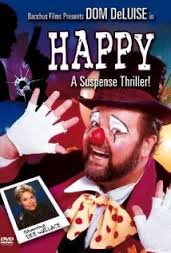
HAPPY
US, 1983, 100 minutes, Colour.
Dom Deluise, Dee Wallace, Jack Gilford, Henry Silva.
Directed by Lee Phillips.
Happy is a telemovie with Dom Deluise as executive producer and star. He gets the opportunity to portray a TV comedian called Happy - whose show has been cancelled, but who travels the countryside playing at malls, hotels and other engagements. He is divorced, but has a loving son (played by Deluise's own son, David). His sidekick is Jack Gilford.
Performing in a hotel, he witnesses a gangland killing. The police do not believe his identification of the killer - but there is an eventual confrontation in a TV studio. Deluise enjoys himself in the role. Dee Wallace is attractive as a sculptress who befriends him, Henry Silva does yet another of his villains. An enjoyable telemovie.
1.Interesting and entertaining drama, story of a comic, the gangland killing and the investigation, confrontation?
2.The American locations, authentic, on the road, the malls, hotels, police precincts, homes? The credibility of the plot, characters and behaviour? Musical score and songs?
3.The title, the character, Roger as Happy - covering his own personality? Performance and style, TV popularity, Bernie's criticisms, the clown make-up, referred to as a clown? Drawing responses from the audience? The finale?
4.Roger as Happy: performing, with audiences, becoming his character? His puppets and design? Friendship with Bernie, Bernie's exasperations? Friendship with Sandy, the divorce, taking Roger Junior out? Love for his son? The performance at the hotel, rehearsals, friendship with Marilyn? The performance and welcome, the older generation liking him? The killings, standing up to the killer? The police questioning, everybody else witnessing that the killer was black, Happy knowing make-up? The sculpture with Marilyn? The dangers, the killer confronting his son? His moving away? Going to see Bernie, Bernie's death? The award by the city for his bravery? The possibility of performance, TV, luring the killer, getting the gun, the chase, the confrontation in the studio? His overwhelming the killer? The happy ending?
5.The killer, the brutality of the murders, the identity? His disguise? Return to the hotel (and the unreliable witness of the desk clerk, the prostitutes)? Reading the paper, the sculpture, visiting Sandy and Roger, the menace? Sandy warning Happy? The disguise at the studio, the confrontation?
6.Marilyn, sculptress, cocktail server, friendly with Happy? Sharing with him, his apartment, her apartment, the puppets, her performing with the puppets?
7.Sandy and David, friendship with Roger, the breakdown of the marriage, the continued friendship? The dangers for Roger?
8.Bernie, the producer, sidekick and stooge, his performance - in the diner, the pea soup boiling etc? Injury, final scene with Happy?
9.The police, investigations, witnesses, their exasperation, not believing the clown? Going on hunches? The identity of the killer? The ending?
10.The blend of drama, comedy, gangland thriller?
Published in Movie Reviews
Published in
Movie Reviews
Tagged under
Saturday, 18 September 2021 19:21
Hanging Up
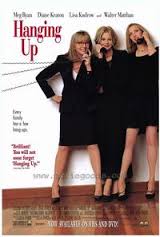
HANGING UP
US, 2000, 95 minutes, Colour.
Meg Ryan, Diane Keaton, Lisa Kudrow, Walter Matthau, Adam Arkin.
Directed by Diane Keaton.
Hanging Up was written by the team of sisters, Norah and Delia Ephron. They have written such screenplays as Sleepless in Seattle and You've Got Mail. These latter films also starred Meg Ryan.
This time direction is not by Norah Ephron but by Diane Keaton, who had made such films as Heaven and Unstrung Heroes. The film focuses on three sisters, a feminine perspective from the writers and the director. One sister, played by Meg Ryan, has the responsibility of looking after their father who has to go into a nursing home. The sister played by Diane Keaton is preoccupied with the success of her magazine. The youngest sister, played by Lisa Kudrow, lacks self-confidence and is very conscious of her being a star in a soap opera. The film shows the interaction between the three, culminating in a fight but ultimately resolved, on the occasion of the death of their father. Walter Matthau enjoys himself as the father.
The film is a mixture of screwball comedy style and serious themes. Meg Ryan is somewhat hard to believe in the central role, playing in an artificially strained style for the serious and the comic. She is far more effective when she is more reflective and silent. However, the film treats contemporary themes and focuses on the nature of family and relationships.
1.A film about family, relationships between sisters, relationships of daughters to father? The family, marriage and marriage break-up? Love, tensions, self-centredness? Disputes, resolutions, love? The opening credits, the photos of the girls, the introduction to each of the three sisters?
2.The use of phones and phone calls throughout the film, interrupting real life for answering calls? Phone calls as a way of communication, as a way of cutting off communication? The latter part of the film and the advice to break free and turn off the phone? The significance of the title?
3.Eve and her father, the character of her father, the questionnaire at the hospital and his not telling the truth, his fooling around, the discussions about John Wayne and the photo with Eve, guns and sexuality? His begging his daughter not to stay in the home? His losing his memory?
4.Eve and her flashbacks, the memories of her mother and her mother ignoring her? Her being on the phone and crashing the car? The reaction of the doctor to the crash, his talk about his mother and her later appearing and discussing family with Eve? Eve and her absent-mindedness, the car crashes? Her relationship with Joe, with her son? Tripping over his toys? The introduction to the character of Eve and audiences identifying with her and her responsibilities?
5.The character of Maddie, the youngest daughter, feeling ignored by the other two, her wanting to be a rock star, unsettled in life, her being in the soap opera, her identifying with her character and the situations of the soap opera? Her lack of response to Eve and concern about her father? Ringing about her dog and the coma? Bringing the dog over for Eve to look after it? Her sharing with Eve, going to the speech by Georgia and their reaction? Watching the soap opera with their father? Her decision to move out of the soap opera?
6.Eve, her work, preparing the party, the Nixon questionnaire, the people and their demands to get Georgia?
7.The father in the hospital, ringing up wanting Chinese food, playing cards, the sexual advance and his memories of his wife, mixing her up with Eve? Eve and the flashbacks to her father, his being in bed with the dentist's assistants? Eve looking through the photos and remembering her life? Her father becoming dependent on her, his wife walking out, his grief, taking the pills? His going missing from the institution and going back to their home?
8.The portrait of the mother, her leaving, Eve's visit, her mother explaining that she never wanted to be a mother? The self-centredness and its being justified? The effect on Eve? On the other daughters?
9.Georgia, smart style, the oldest sister, being a mother to Eve? The discussions about her being sacked - and her comeback with starting her own magazine, calling it after herself? The fifth anniversary issue? Photographers, make-up?
10.The flashback to 1993, the bond between Maddie and Eve, Georgia being fired? Their discussions and being able to talk to one another? Eve's son and his birthday, her father drunk, his ruining the party, wanting to ring his wife, his malicious comments to Eve, "Throw that one back"? Eve's dismay, her husband's anger and forbidding her father into the house?
11.The difficulties of the father in hospital, Georgia advising him to sign a blank cheque and his resistance? The doctor's mother talking to Eve about the accident and the insurance - and people wanting to make others miserable? Her comments about the necessity to disconnect? Eve telling a lie about her mother being killed in a fire and her father's reaction, "I won"? The irony of the dog eating the mobile phone and Eve pulling the cord to the phones in her house?
12.The party, Georgia's arrival as a celebrity? The women wanting to hear her, discussions about the magazine, her self-centred speech, the grief about her father's illness and her dramatising it? Her comments about death and helping women to face these realities?
13.The fight and the truth about Georgia and her selfishness, even stealing Eve's recipe? The three sisters and the clash?
14.Their father in a coma, their not talking to each other, the gradual reconciliation, the puzzle about the actress - and the father saying "June Allyson" and dying?
15.The final reconciliation, Eve sitting at the table and her memories? The flour fight and the bond between them? The experience of their family, the absent mother, growing up, the strengths and weaknesses of their father, final illness and death?
Published in Movie Reviews
Published in
Movie Reviews
Tagged under
Saturday, 18 September 2021 19:21
Hancock
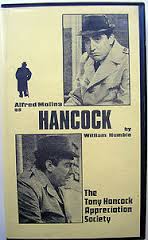
HANCOCK
UK, 1991, 116 minutes, Colour.
Alfred Molina, Frances Barber, Mel Martin, Malcolm Sinclair, Jim Carter.
Directed by Anthony Smith.
Hancock is a BBC telemovie, a portrait of the English comedian during the last ten years of his life. Hancock was a very popular comedian on radio and television, especially with Hancock's Half Hour. The film focuses initially on one of his sketches, The Blood Donor, famous for exemplifying his style. Hancock did not make a successful transition to movies, in fact being sacked from the Disney Studios Bullwhip Griffin. An alcoholic, erratic in his treatment including his writers, his wife, friends, he was often in depression. In 1968 he came to Australia and there committed suicide, leaving a note saying that too much had gone wrong in his life too often.
Hancock is well portrayed by Alfred Molina (Letter to Brezhnev, Prick Up Your Ears, American Friends, Not Without My Daughter). He impersonates Hancock's comic routines and gives humanity to his portrait of the comedian. There is a strong British supporting cast led by Frances Barber as his wife Freddy. Freddy Hancock was consultant to the production.
1.Impact of the telemovie? For a British audience, Commonwealth audience? Wider audience? Audience knowledge of Hancock as a comedian, appreciation of his comic style? A memoir?
2.Hancock the British comedian, British style, humour, verbal, timing? The British industry, radio and television, cinema? Hancock at home, his relationships? His visits to the United States, to Australia? Authentic atmosphere of the '50s to the '60s? Musical score?
.3.The title, the focus on Hancock himself, his reputation? The sad comic?
4.The time-span of ten years from '58 to '68? Hancock and his age, changes, drinking, marriage and relationships, fame and collapse of his career, depression? His attitude of mockery towards others? The final despair - too many things going wrong too often?
5.The opening with the sketch of The Blood Donor: the type of humour, Molina's impersonation of Hancock as comedian? Galton and Simpson, the writers? Acting, the appreciative audience? The Blood Donor being quoted throughout the film? The skill in the half-hour comedy? The Punch and Judy Man and the filming? The visits to the United States, the Disney Studios, the filming of Bullwhip Griffin and the various takes? Hancock and his impersonations, the final show repeating his impersonations?
6.Alfred Molina's interpretation of Hancock: in himself, as a comedian, as a mimic? His work, interaction with the writers, clash? His friendship with John le Mesurier? With Freddy as his agent, the sexual liaison? His relationship with his wife, scenes at home, the drinking, her private drinking? Going to the United States with her? His hopes, taking the tapes, the failure? The encounter with the young boy, on the movie set, looking at the sand statues on the beach? His reflecting on their transience? The boy and friendship in Hollywood, Bullwhip Griffin? Going to America, the treatment by the Disney Studios, producer and director, his tantrums, the many takes, his being ousted? His fans and their flattery? Flattery and the reality? His worry and depression, health, going to the doctor, joke about the vodka? The final concert, his repeating his routines? Finished?
7.John le Mesurier, his friendship (and Freddy being married to le Mesurier - though this not indicated in the film?)? John listening to him, advice? Sounding-board?
8.Hancock's wife, the sketch of her personality, her relationship with him, her drinking, the trip to America, leaving him?
9.Freddy and her personal intensity (and the suicide attempts related in her biography but not in the film?)? Work as an agent, the relationship with him, covering for him, the edge in their relationship? The proposal, the marriage? Going to Hollywood, her concern about him, giving up the drink, the visit to the doctor? Her giving up hope? Her watching his final concert and the pathos?
10.Hancock's popularity, audiences, the bus driver in the street, people for autographs? The fans at the final concert? The taxi driver finally criticising his performance?
11.Going to Australia, his hopes, the interviews? His tone of mockery, Olivier and Othello, his speculation about King Lear? His talking on and on - the Australian questions, obtuse, sensible? The gradual fading on the screen indicating his collapse and death?
12.Glimpses of Hancock, memories of his comedy, a memoir of a person, a portrait and understanding?
Published in Movie Reviews
Published in
Movie Reviews
Tagged under